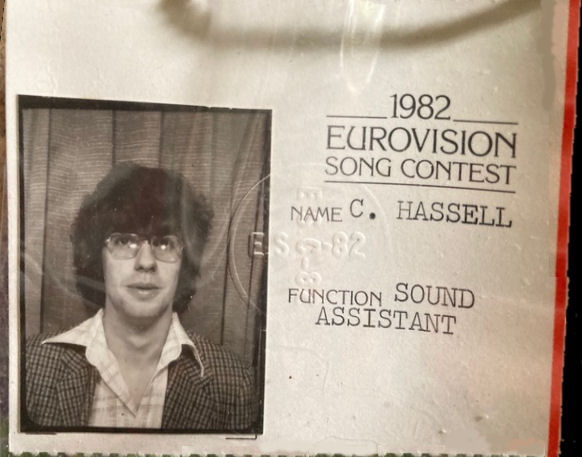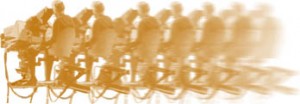Eurovision 1974
Alan Taylor
Whenever there is a World Cup, it’s impossible for the British media to cover it without mentioning England in 1966. Similarly for the Eurovision Song Contest, it’s obligatory to mention ABBA winning in 1974.
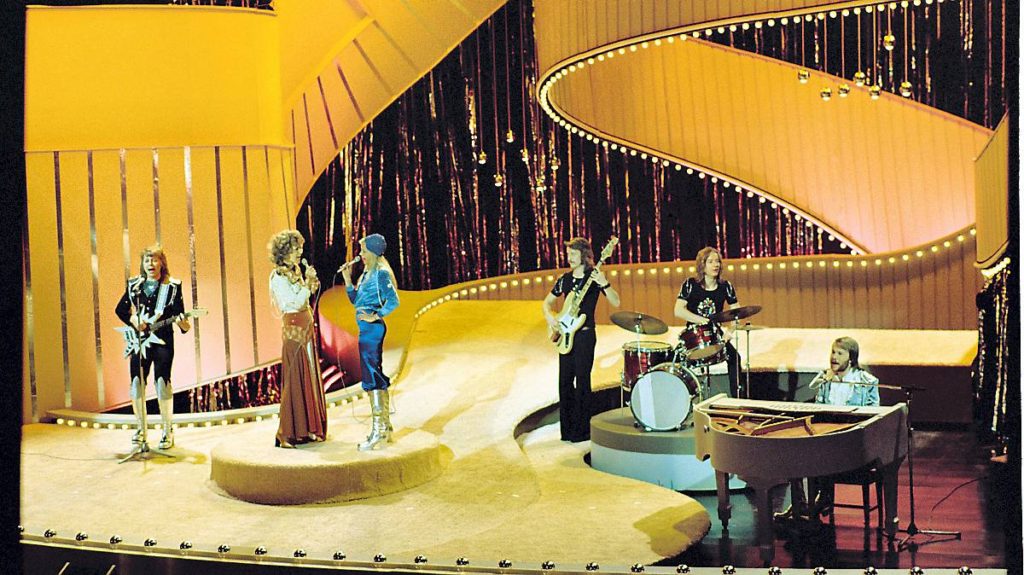
I was a young sound guy in those days and was part of the crew responsible for getting stage mics on and off. Before going further, it’s time for a trivia question. You either already know the answer, or won’t guess, even if you were given twenty guesses: Who represented the United Kingdom when ABBA won Eurovision in 1974? I’ll provide the answer later.
If you’re into Eurovision trivia, you might also like to guess who did the commentary for BBC TV? You might guess it was Terry Wogan and he was there, but he did the radio commentary. The television commentary was done by David Vine. He did a straightforward commentary, quite unlike the style of commentary which was going to become established once Terry Wogan and then Graham Norton were handed the lip mic.
The BBC agreed to host Eurovision because Luxembourg had won in 1972 and 1973, but didn’t want the expense of hosting the event for two successive years. The venue was The Dome in Brighton, and it was televised as an OB. There were some interesting challenges on that show. It was a conventional theatre with a proscenium arch. The on-stage crew worked from the wings either side of the stage.
The first challenge was that the stage sloped towards the audience. Not a lot, but enough to make tall microphone stands lean awkwardly away from the performers. The solution I came up with was to tape washers near the hinges of the feet on the microphone stand so that the foot pointing towards the audience is offset downwards just enough to make the mic column stand vertical.
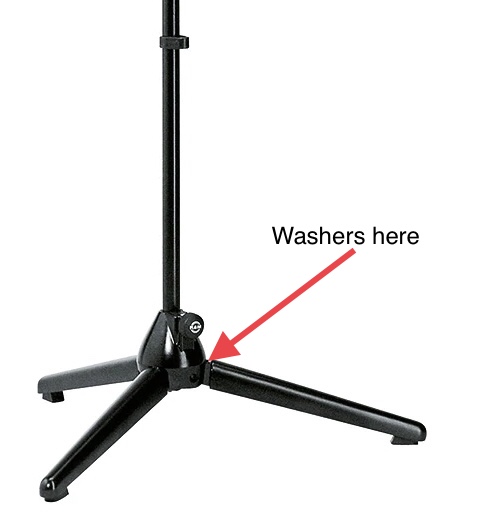
I couldn’t find any suitable washers on the scanner and the chippies only had stuff which would have looked weird. Fortunately there was an excellent old-fashioned hardware shop very close to the theatre, near The Lanes. I took one of our mic stands into the shop, along with a paper template for the angle it needed to adopt. The guy in the shop was great. When I explained what I was looking for, he fetched a big case of washers in little compartments. We found the ideal washers and I tried to buy a full box of that size so that we could tweak twenty or thirty microphone stands. He refused to accept any money, even though I explained I could reclaim it on expenses. He was thrilled that all those celebrities were in town and was delighted to help out. I asked his name; I think it was Kevin.
A couple of days later I was able to take him a signed photograph of Olivia Newton John (there’s your trivia answer). She had written “To Kevin, thanks for your help. Olivia”. To say he was delighted was something of an understatement.
The washers worked perfectly, they could be taped close to the hinge and were invisible in shot. The next problem was also to do with the stage. The art dept had decided to cover it with an off-white fairly long pile carpet. Admittedly it looked great in shot and didn’t reflect too much light, but it was very difficult to put marks down for identifying the positioning of things. I ended up getting some white 1” diameter sticky labels. We could mark and label a position very easily, but the marks were inconspicuous in shot.
Once an act were happy during rehearsal and the shots were decided, I could mark the spot for the mic stand and marked my script accordingly. Something like microphone VOX 3, Position E, tall stand extended to 135cm. Similar notes were made for all the other mics. Separate notes were made about microphone types and where they were plugged into the multi boxes. In those days backing tracks were not allowed. There was a live orchestra and all on-stage instruments and backing singers had to be catered for. Some acts required quite a few microphones to be set and there might also be DI feeds from keyboards and isolating transformers too for amplifiers, keyboards and other equipment.
Turn around between one act and the next was going to be rapid and of course it was a live show, so it all had to work efficiently. If I remember correctly, that year was the first time they covered the changeover between acts by running VT recordings of the artists rehearsing and doing the touristy things in town, therefore the time to changeover was fixed and couldn’t be extended in any way., We carefully noted any changes following each rehearsal and by the time of the dress rehearsal, it was running like clockwork. Once act 1 had been set, we could start to pre-set the heights for the stands for act 2 and gather everything together ready for the changeover. If microphone Vox 1 was used on consecutive acts, it was quicker to bring on a second mic stand set to the correct height for act 2, put it on its mark and swap the mic over before taking away the old mic stand.
We pre-set stuff in the wings while the previous act was performing. Being a theatre, the space in the wings was limited and there were loads of other stuff which needed to be there too, together with an ever-increasing number of hangers-on who just wanted to watch the show from there. We had to be quite tactful but still forceful, telling people to go away so that we could have a little bit of space to do our job. We still ended up with people who stood on microphone cables while they were being run out – very few radio mics were used in those days. Fortunately as the changeovers were during VT inserts, no live sound was being transmitted from the stage, so, if necessary, we could shout at the person to step away from the cables. I’ve never worked out how anybody can stand on a figure-of-eighted cable and be oblivious to it being uncoiled.
At some point in the dress rehearsal, the proceedings had to be stopped for a few minutes – I can’t remember exactly why. The band on stage just sat on the comfy carpet and we all waited until we could continue. Except the band didn’t just sit there. They noticed that somebody had left a lot of round sticky labels on the carpet and ‘helpfully’ peeled them off so that it would look nice for the show. I didn’t immediately notice what they were doing, but by the time I realised and rushed on stage to stop them, the damage had been done.
Fortunately I was trained to be a belt and braces sort of chap and as a precaution had marked up a copy of the stage plan with our microphone positions. It was possible to recreate our marks quite rapidly and as far as I’m aware, it worked accurately for the camera shots that had been rehearsed.
The television show always ends with the winning act reprising their performance. During early rehearsals, any act might be called to be the ‘winning’ act for the purposes of rehearsal, but Michael Hurll felt that that for the dress rehearsal, choosing any particular country to pretend to be the winners might either give that act an unfair boost, or jinx them. His solution was to hire a chap called Norman Caley. He was an actor who also performed a novelty act where he sung the traditional song ‘Galway Bay’. While he performed exuberant arm movements, his arms would gradually lengthen until they were about twenty feet across. It was one of those acts where initially you wonder what the hell is going on because he wasn’t much of a singer, but the audience slowly notice his arms lengthening until they reach comically absurd lengths. Michael Hurll didn’t tell the cameramen what to expect, he just directed them to shoot it wide. It was the perfect way to send performers and crew away in a good frame of mind ready for the live show.
We had noticed ABBA very early on and felt that they were certain winners. We were able to get to the betting shop and place bets while the odds offered were still fairly attractive. I also placed a bet on Italy and that song did pretty well too.
I don’t have any strong memories of the live show, so that’s probably a good thing. It must have gone well.
Once we were off air, which always seem to involve an over run due to voting issues, the derig went very rapidly. Everything was packed away within a couple of hours and the sound crew went out for a celebratory meal. A late-night table had been reserved at a nearby restaurant.
Having spent most of that week in Brighton and worked intensively to get everything set up ready for the rehearsals and then the live show, adrenalin was kicking in quite significantly. Once it was over, it was definitely a well-deserved opportunity to unwind, let our hair down and celebrate. There may have been wine!
What do other people remember from Eurovision Song Contests? I have previously written about the 1979 Song for Europe show from the Albert Hall which was pulled at the last moment due to industrial action.
Eurovision 1977
Mike Jordan
My Song contest memories are much simpler!
For 1974, I was stationed on Radio Links outside Brighton at Plumpton Plain where we had a van and also a scaffold tower as too many bits of links kit to fit on the roof.
I seem to remember we sent pictures directly towards London and a standby route via Rowridge in Isle of Wight.
I did get a chance to visit the Dome for a look around and noticed the lighting platform with really old Strand dimmers, a small more modern one and by the side a single “Domestic” dimmer in a white plate – all there then!
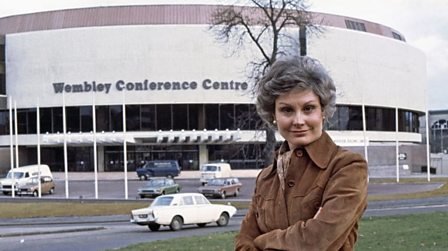
Then for 1977 at Wembley Conference Centre, the link went straight to TC. Best bit there was the “after show” dinner when we all had to wear DJs – even the riggers.
I still have my pass (not posting it ‘cos of an embarrassing photo of me centuries ago).
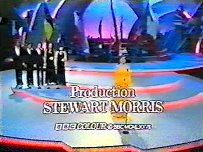
When will all out memories ever fade completely?
Peter Hider
Thursday!!
Eurovision 1981
Bernie Newnham
Jim Moir, when Head of LE, used to say “We only want to come second” thus avoiding an enormous bill. What’s the betting that the BBC volunteers for next year [Ed: 2023: Ukraine won in 2022].
I made this trail, with a very talented Ealing cameraman called Peter…something….
At one point he had the camera upside down on the tripod, held on by his assistant. The opening shot is me, and of course it was necessary to have one bottle of real champagne because the prop stuff is deliberately flat-ish. Bucks Fizz got the flat stuff. We took them to a smart Greek restaurant in Chiswick for lunch, and Cheryl Baker embarrassed the gathering by loudly asking for ketchup with her steak.
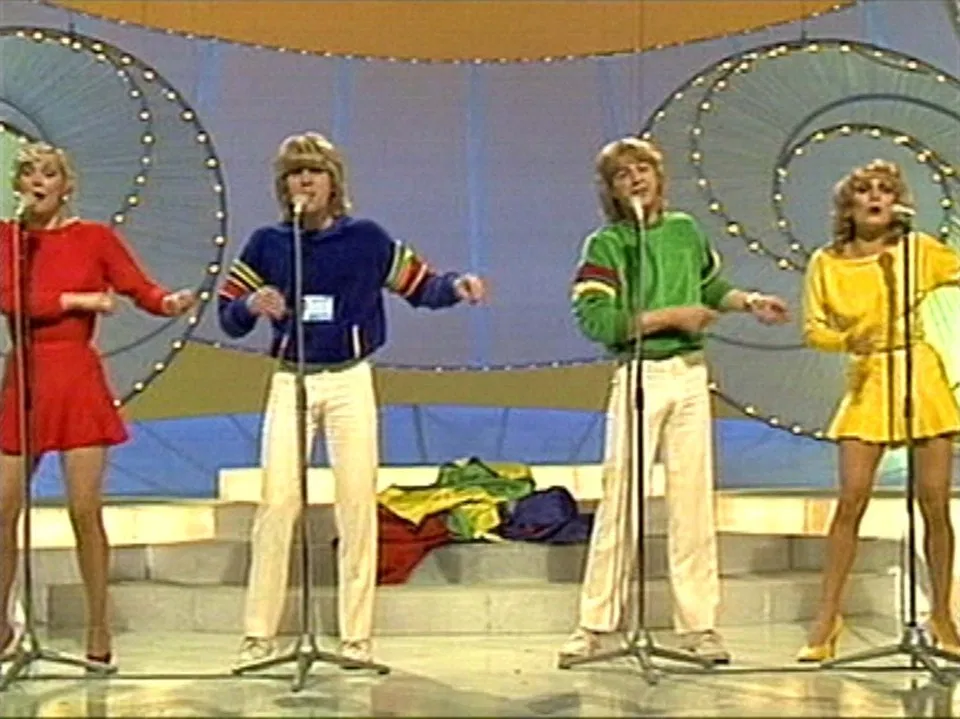
Eurovision 1982
Colin Hassell
The 1982 Eurovision Song Contest was from Harrogate’s brand-new Conference Centre, Michael Hurll Producing.
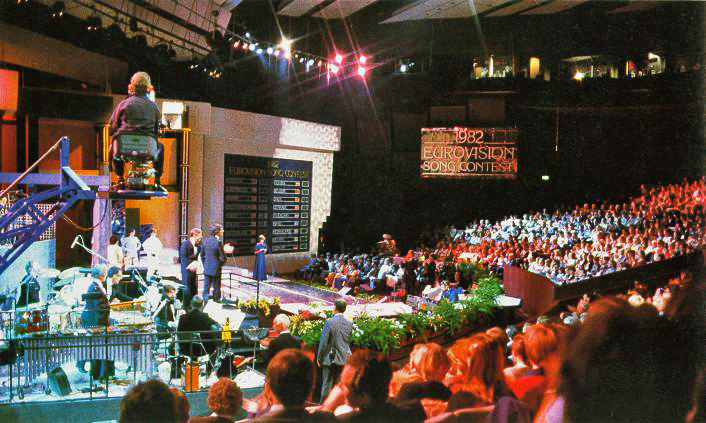
I was part of the Sound Crew running the stage – with Pete Hales our SA1. Sound Supervisor was the great Chris Holcombe.
There were no Radio Mics, it was all cabled. We had a collection of AKG 451 Hand Mics & 451s with VR1 & VR2 extensions, plus other stands as necessary. Up to 6 performers per country, so there could be changes involving 6 cabled mics on, 6 cabled mics off.
We were based in “no-man’s land” between the camera-left side of stage and the additional staging full of Orchestra (lead by Ronnie Hazelhurst). Exiting from stage, having done the change, involved us diving under the Mid-shot shot of the Conductor as they were introduced prior to the song.
Rehearsals were long and intense and we made copious notes of mic type, stand (or if handed to performer), positions of any stands and cable routes. The Stage was covered in tiny labelled marks for each song, together with similar marks put down by the set crew for various items: chairs, risers, pianos, etc.
Following the Dress Run the Designer, Graeme Story, had the whole stage recovered in that ‘sticky backed plastic’ floor film. You have never seen so many people on their hands and knees, armed with penknives, feeling for the marks under the film, and cutting round them to reveal the labels.
Nicole won for Germany and, on her winner’s reprise, sang the song in 4 different languages – not rehearsed and a complete surprise to us all.
Hard work but a fabulous experience to be part of such a show.
Come on Mike Jordan, I’ll show you mine where’s yours?
